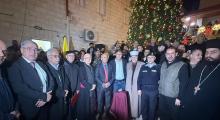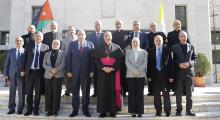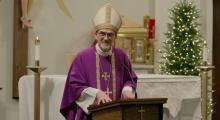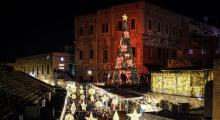Issued by the Catholic Center for Studies and Media - Jordan. Editor-in-chief Fr. Rif'at Bader - موقع أبونا abouna.org
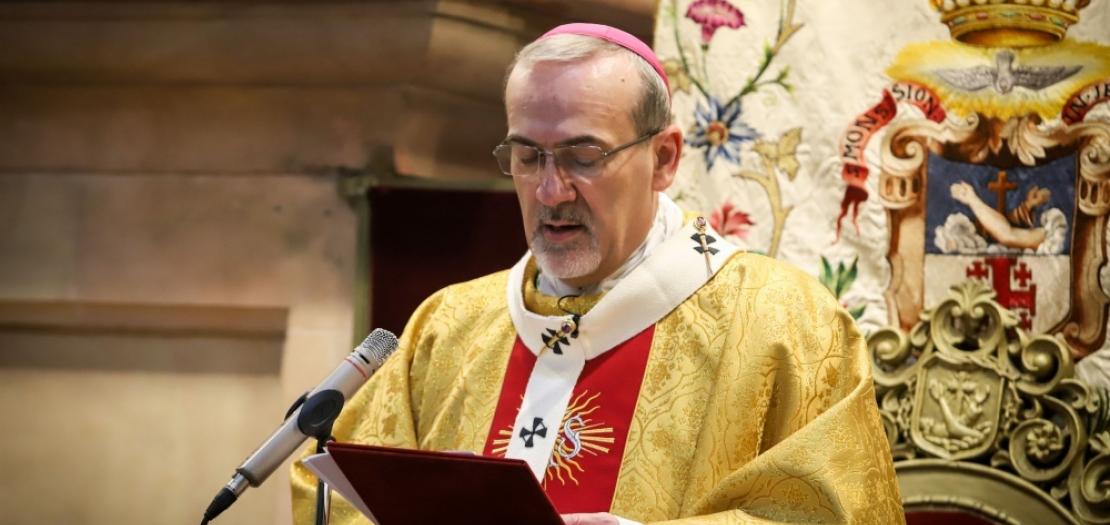
Following is the text of the meditation by Latin Patriarch of Jerusalem His Beatitude Pierbattista Pizzaballa marking Corpus Christi, June 6, 2021:
In today’s Solemnity we read the same Gospel that the Church proclaims on the evening of Holy Thursday, in remembrance of the Last Supper, which takes us back again to the days of the Passion: Jesus offers His Body and His Blood, His life; He offers it in an extreme gesture of love, as a sign of covenant, as food for salvation, as the beginning of new life, for all.
Read today, after the Ascension and Pentecost, in the light, therefore, of the the fullness of the Paschal Mystery, this Gospel takes on a light and a new meaning, and is somehow expanded forever.
So this gesture of Jesus, thanks to the Spirit and in the Spirit, becomes an eternal gesture, forever, always open so that anyone can access it and be nourished by it.
In our passage, Jesus devotes much attention to the preparations (Mk 14:12-16): they are precise. In some way, it is Jesus Himself Who prepares this supper, Who makes it possible. The initiative seems to be the disciples: “where do you want us to go to prepare?” (Mk 14:12).
But it’s not so: they discover that there is already a room prepared, a room that someone has already furnished and prepared (Mk 14:12), and that is up to them alone to bring the necessities for the supper, namely, the lamb, the bitter herbs, the bread and the wine to remembered the exodus of Israel from Egypt. How much they will bring will be taken in the hands of the Lord, and will become Eucharist.
The disciples, besides, ask Jesus where to prepare so that He can eat the Passover (Mk 14:12). In reality, this will not happen according to their expectations because it will not be He who eats the Passover, but He will offer Himself as food so that the disciples can eat a food of eternal life, a completely new food.
The disciples are simply called, in short, to receive the fulfillment of a gift that has always been prepared. But it is also a gift to be prepared for. It is such a great gift that it takes time and preparation to be understood. It needs a journey that little by little makes us realize the greatness of this mystery. For this reason, the Church, even if elsewhere there are different traditions, makes access to the gift of the Eucharist only after a certain preparation and only when there can be an understanding of the gift of the Eucharist. Even in our days, where the “immediately and now” are seemingly a social invention, the Eucharist remains a mystery that needs time, acceptance and understanding.
The Eucharist is first of all an experience of communion: what the disciples are about to experience is not only a convivial moment, it is not just the remembrance of a night of salvation, but it is the gift of life that that make love possible: it is the source in which to attain every possibility of communion. And this is the fulfillment of the covenant. In the Eucharist, love is the true food.
Without this gift, there is no communion possible because it is within the mystery of this supper that man finds the forgiveness that makes him live and capable of loving again. There is no communion possible without participating in this broken and given body, without this body that unites us to itself in a single body.
With the gesture of taking bread and wine, which represent the whole life of man, and offering it to the Father, Jesus restores our life to the One Who gave it to us, and makes it a gift to our brothers.
In this way, the Eucharist is not just an occasional gesture, a moment in the life of Jesus; it is rather the style, the habitual way of living. A way of being in life by taking it in your hands, as it is, to offer it as a gift, to give it back.
Let us return then, also today, to that initial verse of Mark’s Gospel, to the first words of Jesus, those for whom the Kingdom of God is near (Mk1:15).
Because today we understand even better what these words mean and how the Kingdom of God has become near: it is near, it is present in the Church that lives the Eucharist; it is present when the Church lives by the Eucharist, that is, it allows it to be imbued to the point that the Eucharist becomes a style of life, a way of loving and serving.
+Pierbattista


